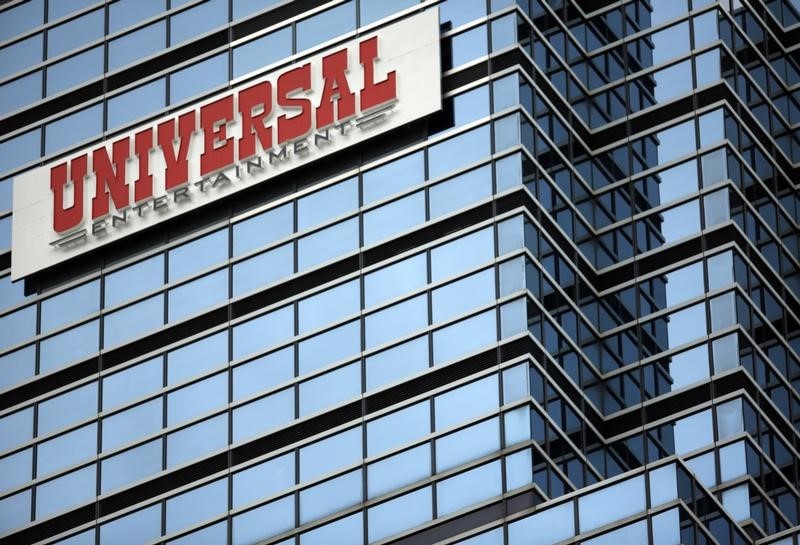By Nathan Layne and Kevin Krolicki
TOKYO/BILOXI, Mississippi (Reuters) - Japan's tax authorities have begun a review of how slot machine maker and casino developer Universal Entertainment <6425.T> accounted for $40 million in payments made in 2010 to an associate of the Philippines' top gambling regulator at that time, people with knowledge of the matter told Reuters.
Separately, the payments are also a focus of a previously undisclosed criminal investigation by Hong Kong's Independent Commission Against Corruption, sources said. The ICAC has become involved because the transfers under review passed through bank accounts based in Hong Kong, those people said.
On Wednesday, Universal said in a statement that its U.S.-based subsidiary, Aruze USA, had received a subpoena from a grand jury in the United States that it believed was related to "suspicion" of bribery related to the payments. The company did not say when that subpoena had been received or where that federal grand jury was seated.
Universal said it believed it would not face charges in the United States "as long as a fair and proper investigation is conducted." The statement by Universal was the first time the company had acknowledged a subpoena or confirmed the existence of a grand jury as part of the federal investigation.
The FBI has been investigating whether payments that originated in a bank account held by Aruze USA that were made in 2010 to Rodolfo Soriano, an associate of the then-head of the Philippine gaming regulator, constituted a violation of U.S. anti-bribery laws, according to people with knowledge of the probe. At the time of the payments, Universal was seeking tax and other concessions related to a casino it is building on Manila Bay.
The National Bureau of Investigation in the Philippines investigated the case as potential bribery but said it was suspending that probe because it did not have access to witnesses in Japan. Soriano did not respond to a request for comment.
Lewis Tam, a spokesman for Hong Kong's ICAC, said the agency "would not comment on individual cases." The FBI declined to comment. A spokesman for Japan's National Tax Agency said it was policy to not comment on specific cases.
Universal had no immediate comment beyond its statement.
MISSISSIPPI RENEWS LICENSE
In recent months, the FBI has continued to gather evidence and interview witnesses, sources have said. The FBI investigation has been underway since 2012.
In addition to the bribery question, the FBI has been examining whether an offered payout to a former Universal employee in Japan to stop cooperating with its investigation constituted obstruction of justice or witness tampering, people with knowledge of the matter said.
The offer of a payment was made in July 2013 by a lawyer for Universal to a former Universal employee if he retracted claims and stopped cooperating with investigators, according to records reviewed by Reuters.
Japanese tax authorities began examining Universal's accounting in 2014 and went this week to the company's headquarters near Tokyo Bay, sources said.
The scope of the tax agency's audit was not clear. The agency has the power to bring criminal cases if it determines there is evidence of wrongdoing, but it has not indicated that the review of Universal has moved from an audit to a more formal investigation.
Universal has blamed the transfers on the unauthorized actions of former employees. The company convened an outside panel of experts which found that while there was no evidence of bribery, the payments pointed to governance problems. Universal restated its accounting for the payments twice in 2013.
Universal has said that $10 million was improperly accounted for as payment for a bad loan. The company has yet to determine how the remaining $30 million was used.
The developments came as Mississippi's gaming regulator on Thursday renewed the license held by Universal's founder and controlling investor, billionaire Kazuo Okada, to sell slot machines in the state, saying it based its decision on its own investigation and not on press reports about the allegations of bribery.
The Mississippi Gaming Commission voted to approve the "suitability" status of Okada, whose license had come up for a nine-year review. The commission also approved the license of Aruze Gaming America, Okada's slot machine subsidiary.
It did, though, add a new clause to Okada's gaming license that would trigger a review for possible revocation in case the probes by the FBI and others are not resolved satisfactorily, the commission's executive director Allen Godfrey told Reuters.
"The allegation is very concerning to me, but until there is something I can hang my hat on, I can't act," he said.
The hearing was the first public appearance in the U.S. by Okada since the FBI launched its probe.
Reuters and Japan's Asahi newspaper are among the media outlets that have reported on the FBI's investigation.
"You may have some doubts as to what I've been doing because of the reports in the press, including Reuters and Asahi Shimbun," Okada said through an interpreter before the commission made its ruling. "These are all misunderstandings. They portray me as if I'm a bad person but that's not the case."

Okada has sued Reuters for defamation based on that reporting. A Reuters spokeswoman said the company stands behind its reporting.